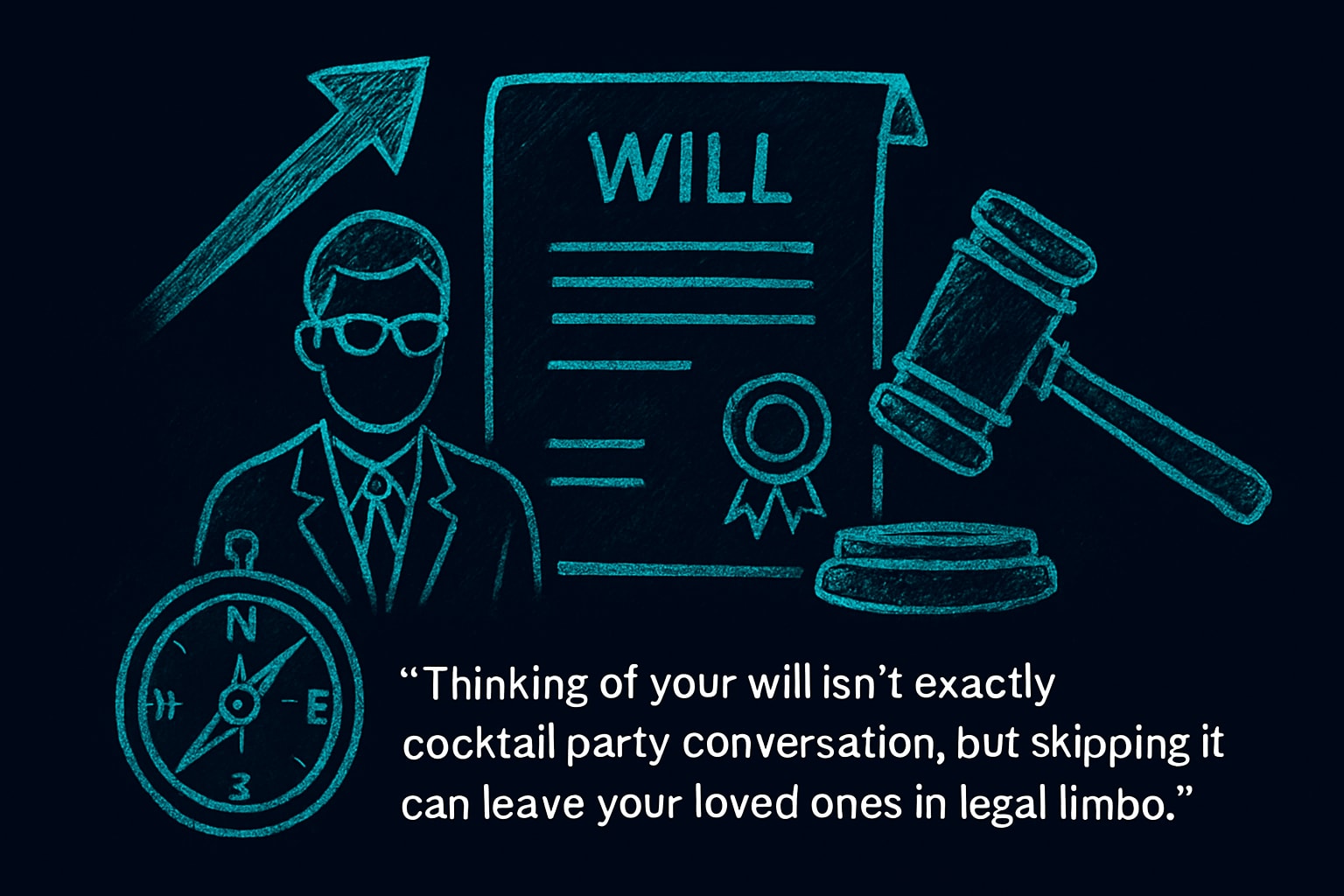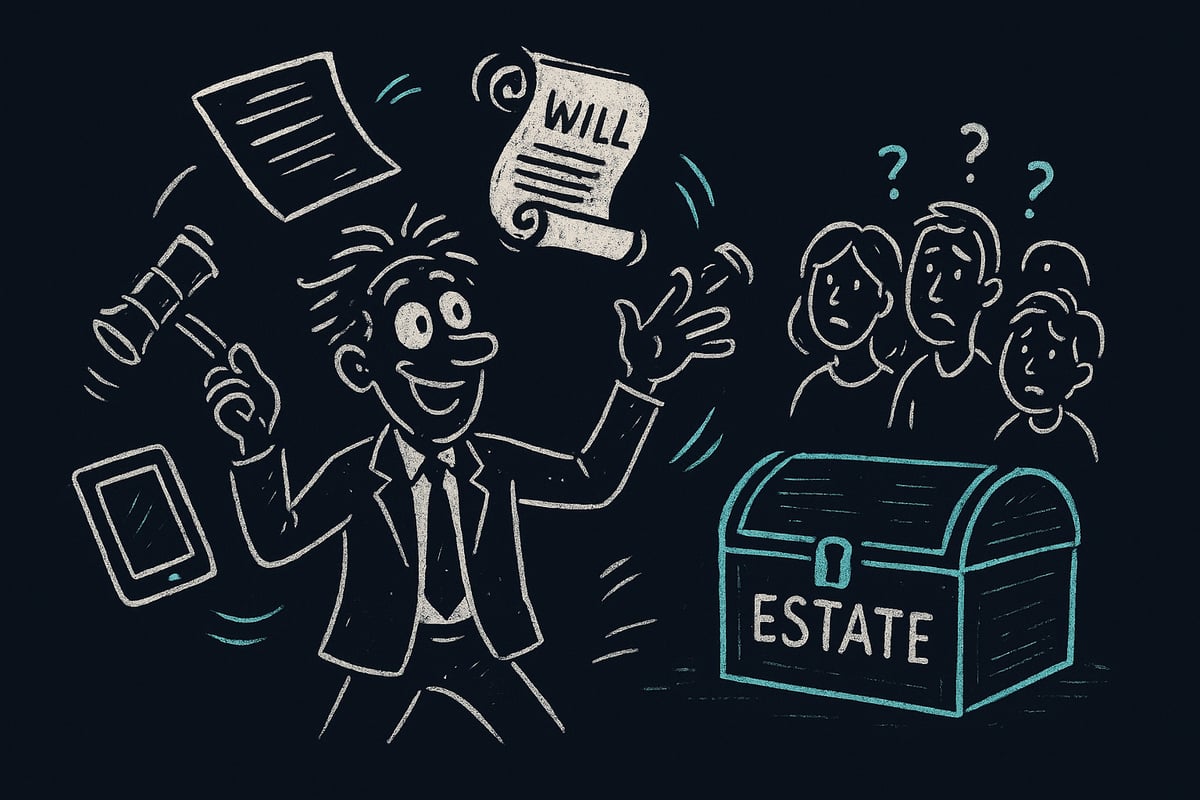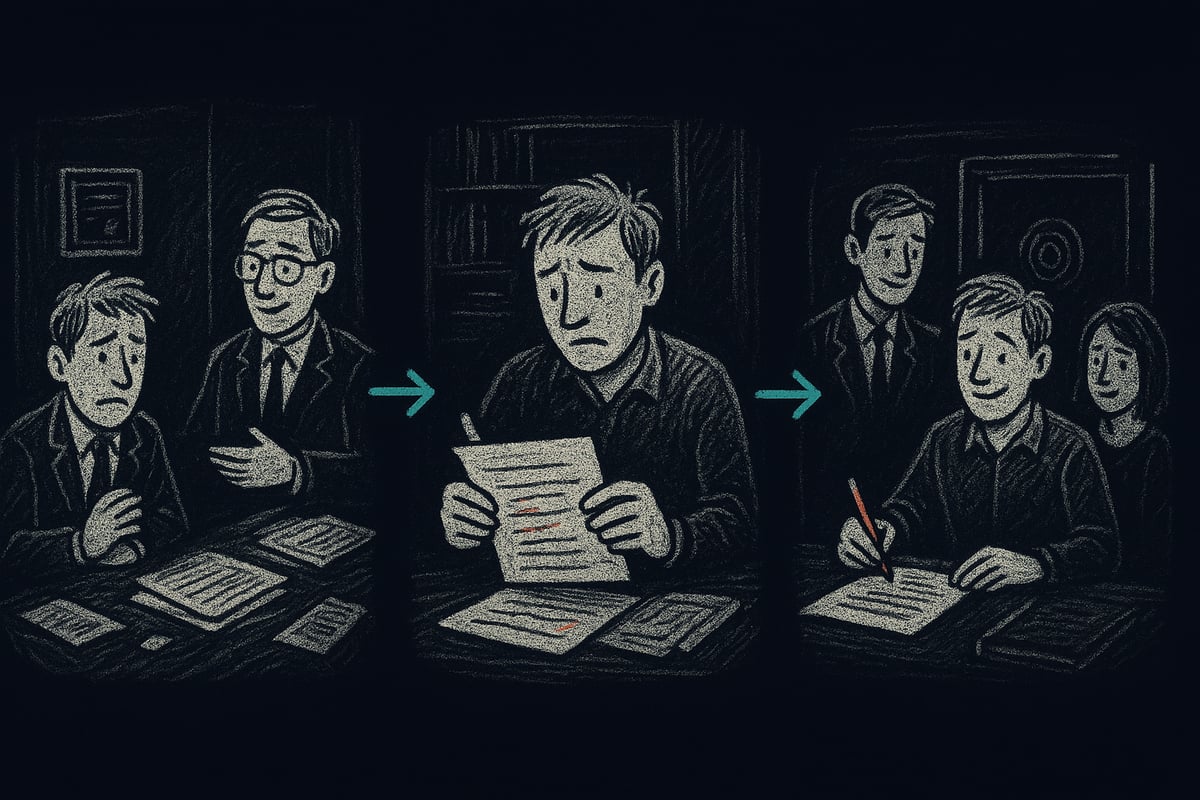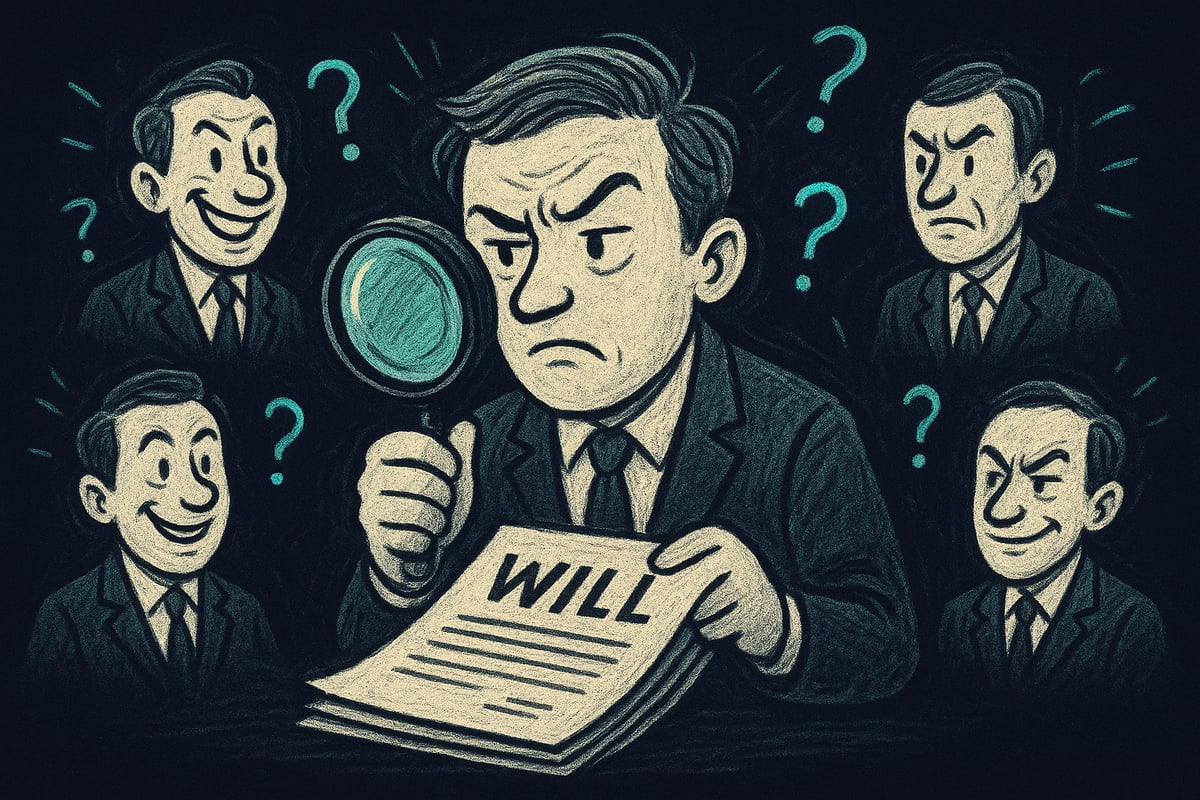The Essential Guide to Attorneys That Handle Wills (2025)

Thinking about your will is about as fun as planning your own funeral playlist, right? Still, if you skip it, your family could end up in a courtroom brawl over your half-used gym membership and that collection of novelty mugs. The confusion, cost, and stress of not handling this properly are legendary, and not in a good way.
Here’s the deal: working with attorneys that handle wills gives you control and peace of mind, so your loved ones don’t have to play detective with your estate. This guide will rip the mystery away and help you make smart choices in 2025.
What Does an Attorney That Handles Wills Actually Do?
Thinking about attorneys that handle wills is about as fun as reading the terms and conditions on your toaster. Still, if you want to avoid a family cage match over your vintage record collection, you need to know what these legal wizards actually do.

Defining the Role of a Will Attorney
Let’s untangle the legal hairball. Attorneys that handle wills come in a few flavors: estate planning attorneys, probate attorneys, and plain old will attorneys. Confused? Good. That means you’re paying attention.
Estate planning attorneys are the architects, designing your will and broader estate plan. Probate attorneys jump in after you’re six feet under, guiding your loved ones through court. Will attorneys specialize in making sure your wishes don’t read like a cryptic treasure map.
Their core services include drafting, reviewing, and executing wills so your stuff goes to the right people, not the state or your least favorite cousin. They make sure your documents are legally airtight, compliant with every nitpicky state and federal rule. Most importantly, they help prevent family meltdowns by catching vague language and potential loopholes.
Consider this: a DIY will written on the back of a pizza menu left a family fighting for years in probate court. Spoiler: No one got the pizza, and everyone lost time, money, and sanity. Attorneys that handle wills are your insurance policy against that chaos.
Key Legal Tasks and Responsibilities
Attorneys that handle wills do more than just play with paperwork. Here’s what’s on their legal to-do list:
- Create a full inventory of your assets (from houses to crypto wallets)
- Name beneficiaries—yes, even your weird uncle can be included
- Appoint executors and guardians for your kids or pets
- Untangle blended family dynamics (stepchildren, exes, “surprise” relatives)
- Use tax strategies to keep more money in your family’s pockets
- Make sure your digital assets are actually passed on, not lost in the cloud
They also keep you out of legal quicksand by ensuring your will meets all local requirements. If you’re curious about the nitty-gritty, check out the full estate planning attorney responsibilities.
Oh, and here’s a terrifying stat: 67% of Americans still don’t have a will as of 2024. That’s like driving without a seatbelt while juggling chainsaws. Don’t be that person.
When You Need a Will Attorney (and When You Don’t)
Do you need attorneys that handle wills, or can you just scribble your wishes on a napkin and call it a day? It depends.
If your estate is simple—think: no kids, no secret offshore accounts, no ex-spouses lurking in the shadows—online solutions might do the trick. But if you’ve remarried, own a business, have a special needs dependent, or just like things done right, you need a pro.
DIY wills are a recipe for disaster: invalid documents, missed assets, and the risk of your PlayStation ending up with your ex. Meanwhile, celebrity estate horror stories (Prince, Aretha Franklin, take your pick) prove that even the rich and famous mess this up.
Bottom line: attorneys that handle wills are your shield against expensive mistakes and family drama. Sometimes, peace of mind is worth more than whatever your stuff is actually worth.
The Step-by-Step Process of Working with a Will Attorney
Think working with attorneys that handle wills is like starring in your own black-and-white legal drama? Spoiler: it’s a lot less exciting, but way more important. Here’s how the process unfolds, so you don’t accidentally leave your prized collection of Beanie Babies to your neighbor’s cat.

Step 1: Initial Consultation and Information Gathering
Welcome to your first date with mortality. During the initial sit-down, attorneys that handle wills will ask you for more personal info than your nosiest aunt. Expect to bring lists of your assets, debts, account numbers, and a rundown of your family circus—stepkids, exes, that cousin who “borrows” everything.
Here’s what you’ll want to haul in:
- IDs and proof of address
- Bank and investment statements
- Property deeds and titles
- Life insurance policies
- List of digital accounts (yes, your crypto and embarrassing Twitter handle)
Attorneys will fire off questions about your wishes, who should inherit what, and who’s trustworthy enough to manage your estate. Everything is confidential, so you can admit you’d rather leave your car to your dog than your brother.
Expect to fill out intake forms that look suspiciously like job applications for the afterlife. If you want a broader sense of the whole process, the Estate planning process overview provides a solid primer.
Step 2: Drafting, Review, and Revisions
Now attorneys that handle wills turn your rambling deathbed confessions into airtight legalese. They’ll draft your will based on your wishes, but don’t worry, you get to review it and catch anything weird—like accidentally leaving your house to your dentist.
Common revision requests:
- Adding new children or pets (kids, goldfish, whatever)
- Changing beneficiaries after a divorce or lottery win
- Updating executors or guardians as people fall out of favor
Attorneys make sure the language is clear so nobody can argue whether “my favorite child” means your actual kid or your golden retriever. They’ll walk you through every section, translating legal mumbo-jumbo into plain English.
Need changes later? If you remarry, adopt, or win the lottery, just ask for an update. Good attorneys that handle wills expect your life to be as messy as your garage.
Step 3: Execution, Witnessing, and Storage
Time for the main event: signing your will so it actually counts. Attorneys that handle wills will tell you exactly how many witnesses you need (usually two, and no, your cat doesn’t count), and whether notarization is required in your state.
Here are your storage options:
- Leave the original at the attorney’s office (they won’t use it as a coaster, promise)
- Lock it in a home safe (bonus points if you remember the code)
- Upload to a digital vault for backup
Some states let you register your will, making it easier to find when you’re gone. Whatever you do, don’t tuck it in a shoebox under your bed—lost or unsigned wills are a classic way to spark a family brawl.
A quick checklist:
- Signed in front of proper witnesses
- Stored somewhere safe, but not so safe it’s lost forever
- Let your executor know where it is (no treasure maps required)
How to Choose the Right Attorney for Your Will in 2025
So, you’ve finally decided that your family shouldn’t have to play Survivor: Probate Edition when you’re gone. Finding the right attorneys that handle wills is like online dating: plenty of profiles, but only a few aren’t hiding something weird. Let’s make sure you swipe right on the legal help that won’t ghost you when things get real.

Credentials and Experience to Look For
Not all attorneys that handle wills are created equal. Some are seasoned pros, others are just hoping you don’t notice their diploma is still warm from the printer. Start with state bar licensure and look for those who specialize in estate planning, not just your cousin’s traffic ticket lawyer moonlighting as a will expert.
Experience matters. Ask how many wills they’ve drafted, and whether they’re members of organizations like ACTEC. Peer recognition and client reviews are your friend—unless you enjoy legal Russian roulette. Watch for red flags like attorneys that handle wills who insist on “must-have” expensive trusts for everyone, even if your only asset is a PlayStation.
Did you know the estate planning legal sector is booming? Demand is surging, so don’t settle for the first name you find. The estate planning market trends 2024 show more lawyers jumping into the game. Quality matters more than ever.
Questions to Ask Before Hiring
Ready for your own legal speed dating? Here are seven questions to grill any attorneys that handle wills:
- What is your fee structure? Flat, hourly, or retainer?
- How do you handle updates if my life takes a left turn?
- What’s your turnaround time from draft to final?
- Have you handled estates with stepfamilies, businesses, or special needs?
- Will you store my will, or do I need to buy a fireproof safe?
- How do you communicate—email, phone, carrier pigeon?
- Can you show me reviews from clients who aren’t related to you?
Don’t be shy. If an attorney gets cagey about clear answers, run. Choosing attorneys that handle wills is about trust. If you wouldn’t trust them with your Netflix password, don’t trust them with your legacy.
Comparing Costs and Understanding Value
Let’s talk numbers. Attorneys that handle wills can cost anywhere from $300 to $1,200 or more. What are you getting for that chunk of change? Here’s a breakdown to help you spot value over vapor:
| Service Included | Cheap DIY ($) | Mid-Range Attorney ($) | High-End Attorney ($) |
|---|---|---|---|
| Will Drafting | ✔️ | ✔️ | ✔️ |
| Tax Planning | ✔️ | ✔️ | |
| Executor Guidance | ✔️ | ✔️ | |
| Secure Storage | ✔️ | ✔️ | |
| Ongoing Updates | ❌ | ✔️ | ✔️ |
Cheap can mean hidden costs, missed assets, or a will that’s about as useful as a chocolate teapot. Attorneys that handle wills bring peace of mind and legal backup. When you compare apples to apples, spending more up front can save your family a mountain of drama later.
Congrats! You’re now slightly less irresponsible than you were five minutes ago. The next move? Start planning your death party—responsibly.
Alternatives to Traditional Will Attorneys: Online Will Services
Thinking attorneys that handle wills are your only ticket to estate planning glory? Let’s shatter that myth. The last few years have seen the rise of online will services—because, apparently, people want to avoid both death and law offices. The digital revolution now includes your last wishes, with a bunch of platforms promising you can skip the mahogany desks, the musty law books, and the billable hour bingo.
The Rise of Digital Estate Planning Platforms
Since 2020, the number of people sidestepping attorneys that handle wills in favor of online platforms has exploded. Why? Let’s face it, nobody’s dying to spend three hours in a legal waiting room just to make sure their vinyl collection doesn’t end up with their ex.
These digital estate planning services cater to folks with straightforward estates, single adults, and families who want control without the legalese. Think: less “courtroom drama,” more “death party RSVP.” Convenience and affordability drive this trend, with many sites letting you whip up a legally valid will between Netflix episodes.
But is this shortcut always wise? Not so fast. While these services are affordable, they have limitations with complicated assets or blended families. In fact, a recent survey shows 35 percent of new wills were created online in 2024, but many Americans still lack any plan at all. Bottom line: online solutions work for many, but not all.
How Online Will Services Work
Here’s the digital magic trick: you answer a guided questionnaire, click a few boxes, and—poof—your will appears, ready for download. Unlike attorneys that handle wills, these platforms use algorithms to turn your answers into legalese that (usually) holds up in court.
Most online services include:
- Step-by-step forms that ask about your assets, debts, and who gets your stuff.
- Instant document generation—no waiting for a call back.
- State-specific templates, so your will is (probably) legal where you live.
- Built-in options for updates if you get married, divorced, or finally buy that vintage pinball machine.
- Bank-level encryption, because even the robot lawyer knows you don’t want hackers inheriting your crypto.
Let’s compare the top three platforms:
| Platform | Starting Price | Update Policy | States Covered | Storage |
|---|---|---|---|---|
| Killswitch | $69 | Unlimited free | 50 | Digital |
| LegalZoom | $89 | Extra fee | 50 | Cloud |
| Trust & Will | $159 | Annual fee | 50 | Cloud |
For simple estates, these services work, but if your family tree looks like a knot or you own a business, you might still need the real deal: attorneys that handle wills.
Killswitch: A Modern Solution for Simple Estates
Let’s get real. If your estate is vanilla—no secret offshore accounts, no kids from five marriages—Killswitch could be your new best friend. Their mission? Make estate planning so easy that even professional procrastinators have no excuse.

Killswitch delivers legally valid wills in all 50 states, and you can finish yours in under 30 minutes. The process is jargon-free, the interface is friendlier than your in-laws, and the price is a one-time $69. No subscriptions, no “surprise” lawyer bills, just peace of mind that your wishes won’t get lost in translation.
Unlike some attorneys that handle wills, Killswitch gives you:
- Unlimited free updates (because life happens)
- Instant downloads for your records
- Bank-level security, so your will doesn’t end up on Reddit
It’s designed for individuals and families with simple needs—the folks who just want to make sure their ex doesn’t get their PlayStation. If your estate is more complicated, attorneys that handle wills still have a job. But for the rest of us? Congrats, you’re finally less irresponsible than you were ten minutes ago.
Common Pitfalls and Mistakes When Handling Wills
So, you finally decide to adult and get your will sorted. Bravo. But even with the help of attorneys that handle wills, people still manage to bungle the basics. Why? Because death brings out the best in paperwork and the worst in families. Let’s roast the most common mistakes, so your legacy isn’t a punchline at Thanksgiving.
Legal and Practical Errors to Avoid
Let’s start with the basics: even the best attorneys that handle wills can’t fix a hot mess after you’re gone. Here’s where most folks trip up:
- Not updating your will after big life events (marriage, divorce, that surprise child).
- Writing your wishes in cryptic, lawyer-proof riddles instead of plain English.
- Ignoring your state’s rules for signing and witnessing. Spoiler: your dog can’t be a witness, no matter how much you trust him.
- Forgetting to add digital assets. Yes, your Bitcoin and that blog about sourdough starters count.
- Example: Someone writes a will, forgets to sign it in front of witnesses, and boom, the court tosses it out like last week’s leftovers.
Even the most expensive attorneys that handle wills can’t save you if you treat your will like a DIY IKEA project with missing screws.
Family and Emotional Pitfalls
Now for the part where the drama really begins. Attorneys that handle wills have seen it all, but here’s what keeps the family group chat spicy:
- Never telling your heirs what’s actually in your will. Surprise, you’re disinherited!
- Leaving weird, unexplained gifts. “To my son, I leave my lucky socks and half the house.”
- Unequal distributions with zero explanation. Congratulations, you just started a decades-long feud.
- Picking an executor who is clueless, unwilling, or already hates everyone else involved.
- Example: Look up famous family feuds. Prince, Aretha Franklin, Picasso—each one a masterclass in how not to communicate your wishes.
Attorneys that handle wills can try to referee, but if you keep your plans secret, expect chaos and a few expletives at the reading of your will.
How to Prevent These Mistakes
Lucky for you, avoiding disaster is easier than faking your own death. Here are some ways attorneys that handle wills recommend you actually get it right:
- Review your will regularly, especially after major changes (marriage, new baby, winning the lottery).
- Call in the pros for anything complicated: blended families, special needs, or that business you started in your garage.
- Document everything clearly. If you want your niece to get your vinyl collection, spell it out.
- Use tech for secure storage and easy access—paper can burn, but encrypted vaults are forever.
- Checklist for annual maintenance:
- Review beneficiary lists
- Update for new assets/debts
- Confirm executor is still alive (and willing)
- Check state law changes
- Communicate updates to your heirs
Do these, and you’ll leave behind a legacy, not a lawsuit.
Look, you already know you’re not immortal—unless you’ve figured out how to upload your consciousness to the cloud (in which case, why are you still reading about wills?). The truth is, your family shouldn’t have to play “Hunger Games: Probate Edition” just because you never got around to sorting your stuff. Whether you need an attorney or just a simple will, you’ve made it this far, so congrats—you’re officially less irresponsible than you were 10 minutes ago. Ready to avoid family feuds and keep your legacy out of courtroom chaos?
Start My Will Now
Related Articles You Should Read
What Happens If You Die Without a Will in Tennessee: 2026 Complete Guide
What Happens If You Die Without a Will in Tennessee: 2026 Complete Guide Meta Description: Dying without a will in Te...
What Happens If You Die Without a Will in Pennsylvania: 2026 Guide
What Happens If You Die Without a Will in Pennsylvania: 2026 Guide Meta Description: Die without a will in Pennsylvan...
What Happens If You Die Without a Will in New York: 2026 Complete Guide
What Happens If You Die Without a Will in New York: 2026 Complete Guide Meta Description: Die without a will in New Y...